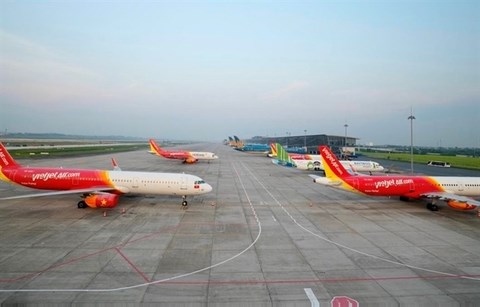Ministry of Transport proposes lifting ceiling airfares
The Ministry of Transport has proposed increase ceiling airfares for domestic flight routes of over 500km by VND50,000 – 250,000 after eight years of being unchanged.

The proposal was raised in a draft circular amending Circular No 17/2019 about the airfare bracket for passenger transport on domestic flight routes, which was being raised for public comments.
The ceiling airfares for domestic routes below 500km will be kept unchanged at VND1.6 million per one-way ticket for routes which serve socio-economic development (to remote areas or islands operated by only one carrier) and VND1.7 million for other routes.
For routes from 500km to 850km, the ceiling fare was proposed at VND2.25 million, compared to the current rate of VND2.2 million.
The ceiling fare for routes between 850km and 1,000km was proposed at VND2.89 million, an increase of VND100,000. An increase of VND200,000 was proposed for routes from 1,000km to 1,280km at VND3.4 million.
A further ceiling fare of VND4 million was proposed for routes of over 1,280km, translating to an increase of VND250,000.
The proposal of increasing ceiling airfares was raised in the context that jet fuel prices saw huge fluctuations. Many said that ceiling airfares being kept at low level was hindering the growth of the aviation sector. Some even proposed to remove the caps.
According to the Civil Aviation Authority of Vietnam (CAAV), the current ceiling airfares had been applied since 2015 when Jet-A1 fuel price was at just around US$60 per barrel.
Updates from the International Air Transport Association noted the Jet-A1 price in Asia was around US$85.47 per barrel on June 2.
The CAAV estimated that fuel accounted for around 39.5% of the total cost of airlines, meaning that the expense in jet fuel of airlines in June 2023 was 10.62% higher than December 2014 and 23.14% higher than September 2017. The total cost increased by 7.87% compared to December 2014 and 10.92% than August 2015.
Besides, the exchange rate was also an important factor which affected the cost of carriers thanks to 70% of airlines’ expenses being paid in foreign currencies while ticket sales were in Vietnamese dong.
Statistics showed that the USD/VND exchange rate increased 6.6% from VND21.900 on average in 2015 to VND23,350 in 2022.
Currently, airfares follow a flexible pricing mechanism from low to high depending on ticket terms, time of ticket issuance and market demand.
According to Bui Doan Ne, General Secretary of the Vietnam Aviation Business Association, carriers won't necessarily simultaneously increase airfares with the rise in ceiling prices.
There are six airlines operating domestic routes and absolutely no exclusive routes, Ne said, adding that customers could easily access domestic air transport services with a wide range of choices. Countries around the world were also moving in the direction of loosening and lifting regulations on price brackets.
He said that increasing ceiling airfares would not affect consumers but benefit passengers because it would enable carriers to improve services quality through the diversification of airfares and tickets.
The lifting of the ceiling on airfares would certainly help airlines better meet the needs of passengers, especially during the peak period because airlines could offset the cost of two-way flights.
Economic expert Dinh Trong Thinh said that domestic airfares should be market–based to create momentum for the aviation industry to overcome difficult times. The aviation industry is important to promoting tourism, he added.
Thinh said that airlines should cooperate with tour operators, hotels and local authorities in tourist hotspots to promote travelling.
On June 19, the National Assembly voted to pass the Law on Price with 92.91% approval. Accordingly, the National Assembly agreed to apply ceiling prices on domestic air passenger transport services.
The Ministry of Transport said that it is still necessary to impose the ceiling on airfares because competition in domestic air transport remains limited. There is currently one carrier holding a market share of more than 30 % and dominating the market.
In the long term, the ministry said that the ceiling could be removed when air transport capacity better meets requirements and the aviation market sees more diverse participation of carriers. The competition must be substantive by ticket prices, service quality and passengers need the right to choose based on their capacity.
The removal of the ceiling on airfares of domestic routes must have an appropriate roadmap, the ministry said.
